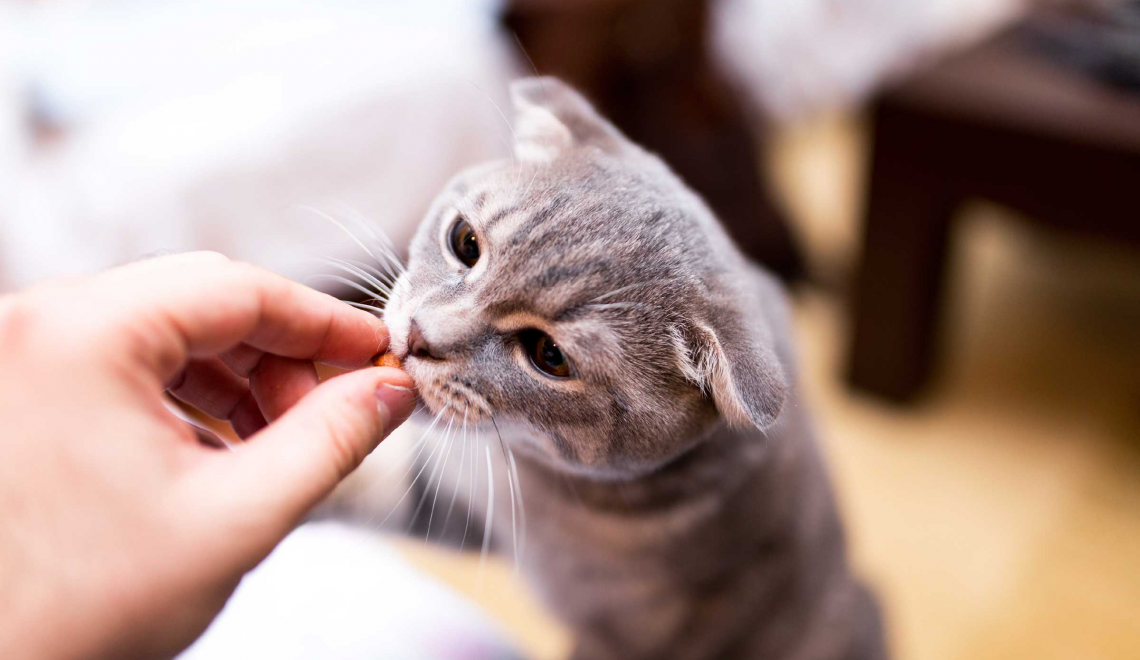5:04 PM
-
0
Comments
In Australia, a shocking 70 percent of cats and 80 percent of dogs experience some level of dental disease by the time they are three years old [1]. Some dogs can have a predisposition to periodontal disease due to the structure of their mouth, the shape of their face and even genetics. Breeds considered at higher risk of periodontal disease can include Bulldogs, Shih Tzus, Pomeranians, and Greyhounds [2].
To help raise greater awareness and encourage Australians to monitor symptoms of this condition, Petstock Vet Dr. Sasha Nefedova shares her expert advice on how to keep your pet’s teeth and gums in tip-top shape.
How do I know if my pet has dental disease?
Dental disease, specifically periodontal disease, is a progressive condition affecting your pet's gums and surrounding bone. It develops in four stages, with the initial stage being the mildest and most easily treatable.
Symptoms may include bad breath, plaque and tartar build-up on the teeth, loss of appetite, difficulty chewing, eating, or bleeding gums. If left untreated, advanced stages of dental disease can lead to tooth loss, gum inflammation, and significant bone loss.
While your pet can’t tell you they’re experiencing pain or discomfort, it’s important to seek prompt veterinary advice as early treatment is crucial to prevent the condition from worsening. If you haven’t yet had your pet’s teeth checked this year, head into your local Petstock Vet for a free dental check with a nurse.
How can I keep my pet's teeth healthy?
#1. Start a brushing routine
While your pet can’t tell you they’re experiencing pain or discomfort, it’s important to seek prompt veterinary advice as early treatment is crucial to prevent the condition from worsening. If you haven’t yet had your pet’s teeth checked this year, head into your local Petstock Vet for a free dental check with a nurse.
How can I keep my pet's teeth healthy?
#1. Start a brushing routine
Brushing your pet’s teeth regularly, whether it’s daily or weekly is the most important way to maintain their oral hygiene. Generally, the younger your pet is when you start training them to have their teeth brushed, the easier it is. It is a good idea to introduce tooth brushing gradually, especially if your pet is a bit older.
To clean your pet’s teeth, make sure you invest in specialised toothbrushes specially designed for animals and are less abrasive than human brushes. Pet-friendly toothpaste is also a must, as many human toothpastes contain the artificial sweetener xylitol, that is toxic to cats and dogs.
Other products that can be used to clean your pet’s teeth include dental wipes, mouth freshening water additives, and even fresh breath foam. If you’re thinking of incorporating these products into your pet’s dental routine but are unsure about which products to use, speak to your local vet or head to your local Petstock store for more personalised advice.
#2. Dental toys and treats
To clean your pet’s teeth, make sure you invest in specialised toothbrushes specially designed for animals and are less abrasive than human brushes. Pet-friendly toothpaste is also a must, as many human toothpastes contain the artificial sweetener xylitol, that is toxic to cats and dogs.
Other products that can be used to clean your pet’s teeth include dental wipes, mouth freshening water additives, and even fresh breath foam. If you’re thinking of incorporating these products into your pet’s dental routine but are unsure about which products to use, speak to your local vet or head to your local Petstock store for more personalised advice.
#2. Dental toys and treats
Not only are they delicious and fun to play with, dental toys and treats are an easy way of helping to maintain oral hygiene.
A great option to consider for pet owners who are short on time, dental toys and treats can be given with minimal supervision, and are designed to help remove plaque and tartar as your pets play and chew.
#3. Consider a dental diet
Aside from dental treats, a pet’s overall diet can also play a role in keeping healthy oral hygiene. Pet owners can explore specially formulated dental kibble that aids in cleaning their pet's teeth as they eat, effectively reducing the formation of plaque and tartar.
Remember that any diet changes should be gradual and must always be conducted under the guidance of a pet professional. Consult your local vet before suddenly changing your pet’s diet to improve oral hygiene.
#4. Get your pet’s teeth professionally cleaned
There’s only so much that home cleaning, dental treats and specialised kibble can do. Once tartar has set and formed throughout the stages of dental disease, it cannot easily be removed at home and thus professional cleaning is recommended.
Like humans, it is advised for pets to receive a professional dental clean once every six months to prevent general build up. As professional dental cleaning is a procedure requiring anaesthesia and a prior dental check, be sure to speak to your local vet if you are considering this option.
[1] https://www.rspca.org.au/latest-news/blog/importance-dental-health
[2] https://www.petstock.com.au/blog/articles/these-13-dog-breeds-are-prone-to-dental-disease-is-your-dog-at-risk
[3] https://www.petstock.com.au/blog/articles/a-sneaky-but-easy-trick-to-check-pets-teeth
About National Pet Dental Month
This August, Petstock is celebrating National Pet Dental Health Month, raising awareness of dental disease and encouraging pet parents to play an active role in keeping their pet’s teeth and gums healthy. Throughout the month, Petstock is providing a range of dental product savings in-store and online. For more information on how to care for your pet’s oral health, visit www.petstock.com.au.
[1] https://www.rspca.org.au/latest-news/blog/importance-dental-health
[2] https://www.petstock.com.au/blog/articles/these-13-dog-breeds-are-prone-to-dental-disease-is-your-dog-at-risk
[3] https://www.petstock.com.au/blog/articles/a-sneaky-but-easy-trick-to-check-pets-teeth
About National Pet Dental Month
This August, Petstock is celebrating National Pet Dental Health Month, raising awareness of dental disease and encouraging pet parents to play an active role in keeping their pet’s teeth and gums healthy. Throughout the month, Petstock is providing a range of dental product savings in-store and online. For more information on how to care for your pet’s oral health, visit www.petstock.com.au.
MEDIA RELEASE, August 2024









